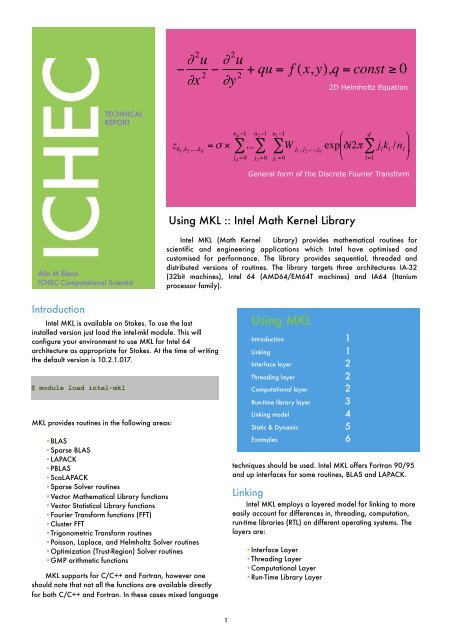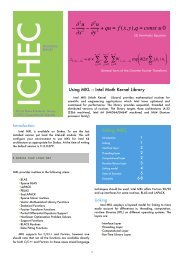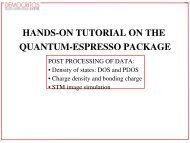Using MKL, the Intel Math Kernel Library (v10.2.1.017) - ICHEC
Using MKL, the Intel Math Kernel Library (v10.2.1.017) - ICHEC
Using MKL, the Intel Math Kernel Library (v10.2.1.017) - ICHEC
You also want an ePaper? Increase the reach of your titles
YUMPU automatically turns print PDFs into web optimized ePapers that Google loves.
<strong>ICHEC</strong>TECHNICALREPORT€€Alin M Elena<strong>ICHEC</strong> Computational Scientist− ∂ 2 u∂x − ∂ 2 u+ qu = f (x, y),q = const ≥ 02 2∂yGeneral form of <strong>the</strong> Discrete Fourier Transform<strong>Using</strong> <strong>MKL</strong> :: <strong>Intel</strong> <strong>Math</strong> <strong>Kernel</strong> <strong>Library</strong>2D Helmholtz Equationn d −1 n 2 −1 n 1 −1⎛ d ⎞z k1 ,k 2 ,...,k d= σ × ∑...∑ ∑W j1 , j 2 ,..., j dexp⎜δi2π∑j lk l/n l ⎟⎝⎠j d = 0j 2 = 0j 1 = 0<strong>Intel</strong> <strong>MKL</strong> (<strong>Math</strong> <strong>Kernel</strong> <strong>Library</strong>) provides ma<strong>the</strong>matical routines forscientific and engineering applications which <strong>Intel</strong> have optimised andcustomised for performance. The library provides sequential, threaded anddistributed versions of routines. The library targets three architectures IA-32(32bit machines), <strong>Intel</strong> 64 (AMD64/EM64T machines) and IA64 (Itaniumprocessor family).l=1Introduction<strong>Intel</strong> <strong>MKL</strong> is available on Stokes. To use <strong>the</strong> lastinstalled version just load <strong>the</strong> intel-mkl module. This willconfigure your environment to use <strong>MKL</strong> for <strong>Intel</strong> 64architecture as appropriate for Stokes. At <strong>the</strong> time of writing<strong>the</strong> default version is 10.2.1.017.$ module load intel-mkl<strong>MKL</strong> provides routines in <strong>the</strong> following areas:•BLAS•Sparse BLAS•LAPACK•PBLAS•ScaLAPACK•Sparse Solver routines•Vector Ma<strong>the</strong>matical <strong>Library</strong> functions•Vector Statistical <strong>Library</strong> functions•Fourier Transform functions (FFT)•Cluster FFT•Trigonometric Transform routines•Poisson, Laplace, and Helmholtz Solver routines•Optimization (Trust-Region) Solver routines•GMP arithmetic functions<strong>MKL</strong> supports for C/C++ and Fortran, however oneshould note that not all <strong>the</strong> functions are available directlyfor both C/C++ and Fortran. In <strong>the</strong>se cases mixed languagetechniques should be used. <strong>Intel</strong> <strong>MKL</strong> offers Fortran 90/95and up interfaces for some routines, BLAS and LAPACK.Linking<strong>Using</strong> <strong>MKL</strong>Introduction 1Linking 1Interface layer 2Threading layer 2Computational layer 2Run-time library layer 3Linking model 4Static & Dynamic 5Examples 6<strong>Intel</strong> <strong>MKL</strong> employs a layered model for linking to moreeasily account for differences in, threading, computation,run-time libraries (RTL) on different operating systems. Thelayers are:•Interface Layer•Threading Layer•Computational Layer•Run-Time <strong>Library</strong> Layer1
•Interface LayerThis layer provides matching between <strong>the</strong> compiled code of an application and <strong>the</strong> threading/computationalcomponents of <strong>the</strong> library. This layer:•provides an LP64 interface.•access to <strong>MKL</strong> ILP64 (access to big arrays with more than 2^31-1 elements programming model).•deals with <strong>the</strong> way in which different compilers return function values.•a way to map single precision names to double precision names in applications that employ ILP64programming model (e.g. Cray-style naming).Interface Layer Librarieslmkl_intel_ilp64 lmkl_intel_lp64 lmkl_gf_lp64 lmkl_gf_ilp64 lmkl_intel_sp2dp•Threading LayerThis layer helps <strong>the</strong> threaded <strong>MKL</strong> to co-operate with compiler level threading. This also provides <strong>the</strong>sequential version layer.Threading Layer Librarieslmkl_intel_thread lmkl_gnu_thread lmkl_pgi_thread lmkl_sequential•Computational LayerThis is <strong>the</strong> heart of <strong>MKL</strong> and has only one variant for any processor/operating system family, Thecomputational layer accommodates multiple architectures through identification of <strong>the</strong> architecture orarchitectural feature and chooses <strong>the</strong> appropriate binary code at execution. <strong>Intel</strong> <strong>MKL</strong> may be thought of as<strong>the</strong> large computational layer that is unaffected by different computational environments. Then, as it has noRTL requirements, RTLs refer not to <strong>the</strong> computational layer but to one of <strong>the</strong> layers above it: <strong>the</strong> Interfacelayer or Threading layer. The most likely case is matching <strong>the</strong> threading layer with <strong>the</strong> RTL layer.Computational Layer Librarieslmkl_lapack lmkl_core lmkl_scalapack_lp64/ilp642
•Run-Time <strong>Library</strong> LayerThis layer has run-time library support functions. For example, libiomp and libguide are run-time librariesproviding threading support for <strong>the</strong> OpenMP threading in <strong>Intel</strong> <strong>MKL</strong>. Note that when using <strong>the</strong> legacylibguide you should also link against <strong>the</strong> POSIX threads library by appending -lpthread.In addition to <strong>the</strong> libraries provided through <strong>the</strong> layered model you have <strong>the</strong> solver libraries, Fortran 90/95interfaces and cluster components. Each of <strong>the</strong>m fits in <strong>the</strong> computational or RTL layer.Run-Time Layer LibrariesSolver Librariesmkl_solver_ilp64_sequential mkl_solver_lp64_sequential lmkl_solver_lp64 lmkl_solver_ilp64Fortran 90/95 Interfaceslmkl_lapack95lmkl_blas95Cluster Componentslmkl_blacs_intelmpi_ilp64libmkl_blacs_intelmpi_lp64lmkl_blacs_openmpi_ilp64libmkl_blacs_openmpi_lp64lmkl_blacs_sgimpt_ilp64lmkl_blacs_sgimpt_lp64lmkl_cdft_corelmkl_scalapack_ilp64lmkl_scalapack_lp64FFT Interfaceslfftw2x_cdft_DOUBLE/SINGLElfftw2xc_intel/_splfftw3xc_intel/_splfftw2xf_intel/_splfftw3xf_intel/_spSequentialVersionStarting with release 9.1, <strong>the</strong> <strong>Intel</strong> <strong>MKL</strong> package provides a sequential (non-threaded) version of <strong>the</strong>library. It requires no RTL layer, that is, no Compatibility OpenMP or Legacy OpenMP run-time library,and it does not respond to <strong>the</strong> environment variable OMP_NUM_THREADS. While this version of <strong>MKL</strong>runs unthreaded code, it is thread-safe (except for LAPACK deprecated routines ?lacon, ?lasq3, and ?lasq4.), which means that you can use it in a parallel region from your own OpenMP code. You shoulduse sequential version only if you have a particular reason not to use <strong>Intel</strong> <strong>MKL</strong> threading. Thesequential version may be helpful when using <strong>MKL</strong> with programs threaded with non-<strong>Intel</strong> compilers orin o<strong>the</strong>r situations where you may, for various reasons, need a non-threaded version of <strong>the</strong> library. Toobtain sequential version of <strong>Intel</strong> <strong>MKL</strong>, in <strong>the</strong> Threading layer, choose <strong>the</strong> _sequential library whenlinking. Note that <strong>the</strong> sequential library depends on <strong>the</strong> POSIX threads library (pthread), which is usedto make <strong>the</strong> <strong>Intel</strong> <strong>MKL</strong> software thread-safe and should be included in <strong>the</strong> link line.3
<strong>MKL</strong> Linking Model[cluster components][mkl_blas95] [mkl_lapack95] [FFTW Interfaces][{mkl_solver, mkl_solver_lp64, mkl_solver_ilp64}]{mkl_intel_ilp64, mkl_intel_lp64, mkl_intel_sp2dp, mkl_gf_ilp64, mkl_gf_lp64}{mkl_intel_thread, mkl_gnu_thread, mkl_pgi_thread, mkl_sequential}[{mkl_scalapack_lp64, mkl_scalapack_ilp64}][mkl_lapack] [mkl_core][guide] [iomp5][{blacs_(mpiLib)_lp64, blacs_(mpiLib)_ilp64}][-lpthread] [-lm]Notes: {a,b,c} only one of <strong>the</strong> libraries should be chosen, [a] library is optional,(mpiLib) stands for intelmpi, openmpi or sgimptILP64When using ILP64 libraries <strong>the</strong> code has to be compiled with -i8 option for Fortran and -D<strong>MKL</strong>_ILP64for C/C++. Mixing code compiled for ILP64 with LP64 libraries leads to unpredictable consequencesand may lead to wrong results so pay special attention when linking or coding for ILP64. There are twocategories of problems that do not support ILP64 in <strong>MKL</strong>; FFTW and GMP.To compile against ILP64 versions (huge arrays) just replace lp64 with ilp644
Static/Dynamic Linking<strong>Intel</strong> <strong>MKL</strong> supports both linking models static ordynamic. Each of <strong>the</strong>m has <strong>the</strong>ir pros and cons. Staticlinking resolves all symbolic references at link time. Thebehaviour of statically built executables is predictable,because <strong>the</strong>re are no run-time dependencies. The maindisadvantage is that having to relink new versions of <strong>the</strong>library to your application may be error-prone and timeconsuming,because you have to relink <strong>the</strong> entireapplication. Moreover, static linking results in largeexecutables and uses memory less efficiently. If severalexecutables are linked with <strong>the</strong> same library, each of <strong>the</strong>mmust load it into memory independently. This matters mostfor executables having data sizes that are small andcomparable with <strong>the</strong> size of <strong>the</strong> executable.Dynamic linking postpones <strong>the</strong> resolution of someundefined symbolic references until run time. Dynamicallybuilt executables contain those symbols along with a list oflibraries that provide definitions of <strong>the</strong> symbols. When <strong>the</strong>executable is loaded, <strong>the</strong> final linking is done before <strong>the</strong>application runs. If several dynamically built executablesreference <strong>the</strong> same library, it is loaded into memory onlyonce and <strong>the</strong> executables share it, <strong>the</strong>reby saving memory.Dynamic linking enables you to separately update <strong>the</strong>libraries on which applications depend and does notrequire relinking <strong>the</strong> applications. The developmentadvantages of dynamic linking are achieved at some costto performance, because every unresolved symbol has tobe looked up in a dedicated table and resolved at runtime.Linking SyntaxDynamic Case -L$<strong>MKL</strong>PATH -I$<strong>MKL</strong>INCLUDE[-lmkl_lapack95] [-lmkl_blas95][cluster components][{-lmkl_{intel, intel_ilp64, intel_lp64, intel_sp2dp, gf, gf_ilp64, gf_lp64}][-lmkl_{intel_thread, gnu_thread, pgi_thread, sequential}][{-lmkl_solver, -lmkl_solver_lp64, -lmkl_solver_ilp64}][-lmkl_lapack] [{-lscalapack ,-lscalapack_lp64, -lscalapack_ilp64}]{-lmkl_{ia32, em64t, ipf}}, -lmkl_core}[{-liomp5, -lguide} [blacs*]] [-lpthread] [-lm]Static Case -I$<strong>MKL</strong>INCLUDE-Wl,--start-group[$<strong>MKL</strong>PATH/libmkl_lapack95.a] [$<strong>MKL</strong>PATH/libmkl_blas95.a][cluster components][{$<strong>MKL</strong>PATH/libmkl_{intel, intel_ilp64, intel_lp64, intel_sp2dp, gf, gf_ilp64, gf_lp64}.a][$<strong>MKL</strong>PATH/libmkl_{intel_thread, gnu_thread, pgi_thread, sequential}.a][{$<strong>MKL</strong>PATH/libmkl_solver.a, $<strong>MKL</strong>PATH/libmkl_solver_lp64.a, $<strong>MKL</strong>PATH/libmkl_solver_ilp64.a}][{$<strong>MKL</strong>PATH/libmkl_scalapack.a ,$<strong>MKL</strong>PATH/libmkl_scalapack_lp64.a, $<strong>MKL</strong>PATH/libmkl_scalapack_lp64.a }]{$<strong>MKL</strong>PATH/libmkl_lapack.a, $<strong>MKL</strong>PATH/libmkl_{ia32, em64t, ipf}.a, $<strong>MKL</strong>PATH/libmkl_core.a}-Wl,--end-group[{$<strong>MKL</strong>PATH/libiomp5.a, $<strong>MKL</strong>PATH/libguide.a,}[blacs*]] [-lpthread] [-lm]Notes: {a,b,c} only one of <strong>the</strong> libraries should be chosen, [a] optional, * <strong>the</strong> version matching <strong>the</strong> mpi library should beused. On stokes and stoney $<strong>MKL</strong>PATH=$<strong>MKL</strong>ROOT/lib/em64t, $<strong>MKL</strong>INCLUDE=$<strong>MKL</strong>ROOT/include5
Linking examplesOne should note <strong>the</strong> dummy libraries mkl_intel, mkl_solver, mkl_gf,mkl_scalapack, mkl_lapack (<strong>the</strong> last one only for<strong>the</strong> static case) are just pointing to <strong>the</strong> _lp64 libraries. libmkl_ia32, em64t and ipf are dummy libraries linking to intel_lp64,intel_thread and mkl_core. Fur<strong>the</strong>r details about <strong>the</strong> libraries contained by <strong>MKL</strong> can be found in <strong>the</strong> Table 3.6 from <strong>Intel</strong><strong>MKL</strong> User’s Guide. On stokes and/or stoney you will need to load <strong>the</strong> following modules intel-cc and/or intel-fc, intel-mkland mvapich2-intel for <strong>the</strong> distributed version. The $<strong>MKL</strong>ROOT variable is defined when <strong>the</strong> <strong>MKL</strong> module is loaded and willcorrespond to a given version of <strong>the</strong> <strong>MKL</strong> e.g. it may be set to: /ichec/packages/intel/mkl/10.2.1.017Sequential and Threaded:intel_lp64, intel_thread, iomp5, this example will link all <strong>the</strong> domain specific functions available in <strong>MKL</strong> which do notneed any extra libraries or interfaces, e.g. BLAS, FFT, VSL, VML, DSS/PARDISO.Dynamic-L$<strong>MKL</strong>ROOT/lib/em64t -lmkl_intel_lp64 -lmkl_intel_thread -lmkl_core -liomp5 -lpthreadStatic$<strong>MKL</strong>ROOT/lib/em64t/libmkl_intel_lp64.a -Wl,--start-group$<strong>MKL</strong>ROOT/lib/em64t/libmkl_intel_thread.a $<strong>MKL</strong>ROOT/lib/em64t/libmkl_core.a -Wl,--end-group-L$<strong>MKL</strong>ROOT/lib/em64t -liomp5 -lpthreadLapack intel_lp64, intel_threads, iomp5Dynamic-L$<strong>MKL</strong>ROOT/lib/em64t -lmkl_intel_lp64 -lmkl_intel_thread -lmkl_lapack -lmkl_core -liomp5-lpthreadStatic$<strong>MKL</strong>ROOT/lib/em64t/libmkl_intel_lp64.a -Wl,--start-group$<strong>MKL</strong>ROOT/lib/em64t/libmkl_intel_thread.a $<strong>MKL</strong>ROOT/lib/em64t/libmkl_core.a -Wl,--end-group-L$<strong>MKL</strong>ROOT/lib/em64t -liomp5 -lpthreadLapack intel_lp64, intel_threads, iomp5, Fortran 90/95 interfaceDynamic-L$<strong>MKL</strong>ROOT/lib/em64t/ -lmkl_lapack95 -lmkl_intel_lp64 -lmkl_intel_thread -lmkl_lapack-lmkl_core -liomp5 -lpthreadStatic$<strong>MKL</strong>ROOT/lib/em64t/libmkl_lapack95.a $<strong>MKL</strong>ROOT/lib/em64t/libmkl_intel_lp64.a -Wl,--start-group $<strong>MKL</strong>ROOT/lib/em64t/libmkl_intel_thread.a $<strong>MKL</strong>ROOT/lib/em64t/libmkl_core.a-Wl,--end-group -L$<strong>MKL</strong>ROOT/lib/em64t -liomp5 -lpthread6
Iterative Sparse Solver intel_lp64, intel_threads, iomp5Dynamic$<strong>MKL</strong>ROOT/lib/em64t/libmkl_solver_lp64.a -L$<strong>MKL</strong>ROOT/lib/em64t -lmkl_intel_lp64-lmkl_intel_thread -lmkl_lapack -lmkl_core -liomp5 -lpthread -lmStatic$<strong>MKL</strong>ROOT/lib/em64t/libmkl_solver_lp64.a $<strong>MKL</strong>ROOT/lib/em64t/libmkl_intel_lp64.a -Wl,--start-group $<strong>MKL</strong>ROOT/lib/em64t/libmkl_intel_thread.a $<strong>MKL</strong>ROOT/lib/em64t/libmkl_core.a-Wl,--end-group -L$<strong>MKL</strong>ROOT/lib/em64t -liomp5 -lpthread -lmcblas intel_lp64, intel_threads, iomp5Dynamic-L$<strong>MKL</strong>ROOT/lib/em64t -lmkl_intel_lp64 -lmkl_intel_thread -lmkl_core -liomp5 -lpthread -lmStatic$<strong>MKL</strong>ROOT/lib/em64t/libmkl_intel_lp64.a -Wl,--start-group$<strong>MKL</strong>ROOT/lib/em64t/libmkl_intel_thread.a $<strong>MKL</strong>ROOT/lib/em64t/libmkl_core.a -Wl,--end-group-L$<strong>MKL</strong>ROOT/lib/em64t -liomp5 -lpthread -lmTouse single precision fftw interfaces add <strong>the</strong> suffix _sp to <strong>the</strong> fftw interface name. Do not forget toadd <strong>the</strong> preprocessor option -DFFTW_ENABLE_FLOAT at compile time and include <strong>the</strong> headers from$<strong>MKL</strong>ROOT/include/fftwfftw2xf interface, intel_lp64, intel_threads, iomp5$<strong>MKL</strong>ROOT/lib/em64t/libfftw2xf_intel.a $<strong>MKL</strong>ROOT/lib/em64t/libmkl_intel_lp64.a-Wl,--start-group$<strong>MKL</strong>ROOT/lib/em64t/libmkl_intel_thread.a $<strong>MKL</strong>ROOT/lib/em64t/libmkl_core.a-Wl,--end-group -L$<strong>MKL</strong>ROOT/lib/em64t -liomp5 -lpthread -lmfftw2xc interface, intel_lp64, intel_threads, iomp5$<strong>MKL</strong>ROOT/lib/em64t/libfftw2xc_intel.a $<strong>MKL</strong>ROOT/lib/em64t/libmkl_intel_lp64.a-Wl,--start-group$<strong>MKL</strong>ROOT/lib/em64t/libmkl_intel_thread.a $<strong>MKL</strong>ROOT/lib/em64t/libmkl_core.a-Wl,--end-group -L$<strong>MKL</strong>ROOT/lib/em64t -liomp5 -lpthread -lm7
fftw3xc interface, intel_lp64, intel_threads, iomp$<strong>MKL</strong>ROOT/lib/em64t/libfftw3xc_intel.a $<strong>MKL</strong>ROOT/lib/em64t/libmkl_intel_lp64.a-Wl,--start-group$<strong>MKL</strong>ROOT/lib/em64t/libmkl_intel_thread.a $<strong>MKL</strong>ROOT/lib/em64t/libmkl_core.a-Wl,--end-group -L$<strong>MKL</strong>ROOT/lib/em64t -liomp5 -lpthread -lmfftw3xf interface, intel_lp64, intel_threads, iomp$<strong>MKL</strong>ROOT/lib/em64t/libfftw3xf_intel.a $<strong>MKL</strong>ROOT/lib/em64t/libmkl_intel_lp64.a-Wl,--start-group$<strong>MKL</strong>ROOT/lib/em64t/libmkl_intel_thread.a $<strong>MKL</strong>ROOT/lib/em64t/libmkl_core.a-Wl,--end-group -L$<strong>MKL</strong>ROOT/lib/em64t -liomp5 -lpthread -lmGMPDynamic$<strong>MKL</strong>ROOT/lib/em64t/libmkl_solver_lp64.a -L$<strong>MKL</strong>ROOT/lib/em64t -lmkl_intel_lp64-lmkl_intel_thread -lmkl_core -liomp5 -lpthread -lmStatic$<strong>MKL</strong>ROOT/lib/em64t/libmkl_solver_lp64.a $<strong>MKL</strong>ROOT/lib/em64t/libmkl_intel_lp64.a-Wl,--start-group $<strong>MKL</strong>ROOT/lib/em64t/libmkl_intel_thread.a$<strong>MKL</strong>ROOT/lib/em64t/libmkl_core.a -Wl,--end-group -L$<strong>MKL</strong>ROOT/lib/em64t -liomp5-lpthread -lmDistributed Linking:cdft, intel_lp64, intel_threads, iomp5, blacs-Wl,--start-group $<strong>MKL</strong>ROOT/lib/em64t/libmkl_cdft_core.a$<strong>MKL</strong>ROOT/lib/em64t/libmkl_intel_lp64.a $<strong>MKL</strong>ROOT/lib/em64t/libmkl_intel_thread.a$<strong>MKL</strong>ROOT/lib/em64t/libmkl_core.a -Wl,--end-group -L$<strong>MKL</strong>ROOT/lib/em64t -liomp5$<strong>MKL</strong>ROOT/lib/em64t/libmkl_blacs_intelmpi_lp64.a -lpthread -lmfdft, intel_lp64, intel_threads, iomp5, blacs-Wl,--start-group $<strong>MKL</strong>ROOT/em64t/libmkl_cdft_core.a$<strong>MKL</strong>ROOT/lib/em64t/libmkl_intel_lp64.a $<strong>MKL</strong>ROOT/lib/em64t/libmkl_intel_thread.a$<strong>MKL</strong>ROOT/lib/em64t/libmkl_core.a -Wl,--end-group -L$<strong>MKL</strong>ROOT/lib/em64t -liomp5$<strong>MKL</strong>ROOT/lib/em64t/libmkl_blacs_intelmpi_lp64.a -lpthread -lm8
scalapackDynamic-L$<strong>MKL</strong>ROOT/lib/em64t -lmkl_intel_lp64 -lmkl_intel_thread -lmkl_lapack-lmkl_scalapack_lp64 -lmkl_core -liomp5 -lmkl_blacs_intelmpi_lp64 -lpthreadStatic-Wl,--start-group$<strong>MKL</strong>ROOT/lib/em64t/libmkl_intel_lp64.a $<strong>MKL</strong>ROOT/lib/em64t/libmkl_intel_thread.a$<strong>MKL</strong>ROOT/lib/em64t/libmkl_scalapack_lp64.a $<strong>MKL</strong>ROOT/lib/em64t/libmkl_core.a-Wl,--end-group -L$<strong>MKL</strong>ROOT/lib/em64t -liomp5$<strong>MKL</strong>ROOT/lib/em64t/libmkl_blacs_intelmpi_lp64.a -lpthread9








